Frito King: How a Farming Legend Rode a River of Corn
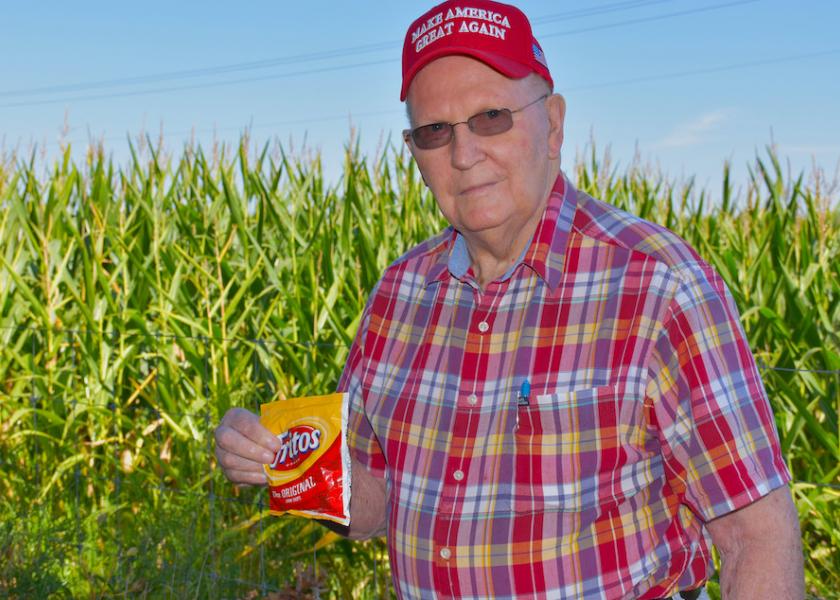
Weary to the bone on a dreary February afternoon at 4:55 p.m., a dejected Max Miller stared from the driver’s seat of a white, 1950s sedan at another front door of another grain elevator beside another nameless backroad in another farming county in another heartland state 250 miles from his Illinois home. Five minutes from closing time, or five minutes to flip a farmer’s future?
Stepping into the wet gravel of an empty parking lot, Miller exhaled niggling bits of uncertainty, mustered his sales pitch for a final forlorn hope, and moved toward the elevator’s main entrance. Chin up, hat in hand, he walked into an empty office and greeted the business’ last remaining occupant of the day—the proprietor.
Miller held up a corn sample and touted its quality, offered the grain for inspection, and watched in dismay as the elevator owner’s gaze jumped from the kernels to the priority of a wall clock with a minute hand on 59 ticks. Miller read the rejection and left the corn and a business card on the counter, offered thanks and farewell, and walked back to the vehicle for a silent, four-hour ride home.
The next morning, Miller walked into his Illinois feed mill office, serenaded by the impatient, shrill jangle of a rotary phone. He picked up the receiver and listened to a life-altering question: “Where in the hell did you get that corn?”
Pig Motel
“Five minutes to five and my life was never the same,” Miller, 91, insists. “People think life revolves around tiny, random moments of luck, but that isn’t true. Hard work creates opportunities that look like chance, but they are set up by God. You have to be ready with all your effort when those moments arrive.”
Miller, born in 1931, is the epitome of an American entrepreneur, and has jammed multiple agriculture lifetimes into nine decades, with a litany of business successes ranging from seed mills to fertilizer to food corn to grain bin construction, all done while maintaining a cattle, corn, and soybean operation on the side.
“Sometimes it seems like a dream,” he recalls. “From a pig motel to five minutes of corn fortune, what a wild, wild ride.”
No Sale, No Avail
Lifetime business partners, the brothers Miller—Max as innovator and Fred the tool of fruition—carried eyes for an angle around the farmland of Oakland, Ill., and throughout their Coles County stomping grounds, in the east-central region of the Prairie State.
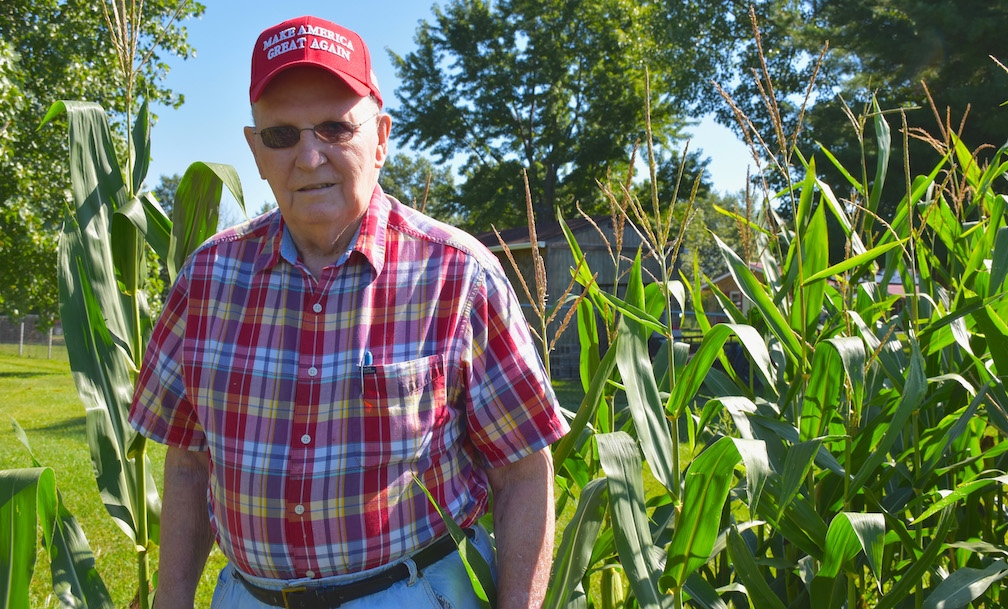
Both brothers served in the Air Force and completed service by 1959. (Fred, 16 months the younger sibling, a Bronze Table student, was utilized as a jet pilot instructor.) Chasing a foothold in agriculture to supplement their father’s cattle and grain operation, the duo looked toward the pork industry. “We owned no pigs and that’s why I thought our idea would work,” Miller describes.
A “pig motel.”
Starting with a modest feed mill in May 1959, the brothers built a holding unit to house 500 feeder pigs in 10 pens. Local farmers answered the call with 50 pigs per pen, and paid 10 cents per day, plus a feed bill.
“We also got $50 per day to scoop the hog s***, and we did that for a couple of years until we converted the pig motel to a fertilizer building,” Miller explains.
Miller was the consummate strategic thinker, using each business success, no matter how small or seemingly inconsequential, as a piggyback opportunity.
As the feed mill gained traction, grain-holding capacity became paramount, driving Miller into a bin business—MDM Supply Company—in an age when picker-shellers were cranking, and significant on-farm storage was in its infancy.
The Miller’s MDM business partner (as well as the builder of the Miller feed mill) was the shoot-from-the-hip, Cadillac-driving Cleo Duzan, an agricultural iconoclast with nonconformity rooted to his core. “When Cleo walked in a room, you knew it. My story would never have happened the same without Cleo,” Miller describes. “He took care of construction and some sales, and me and Fred handled the book work and took care of financing.”
The Miller’s foray into bin construction catapulted them atop an excess of high-quality corn—60,000 bushels.
Enterprising to his core, Miller hit the highway, knocking on ag business doors in surrounding states and beyond. Most elevators were not eager to take a chance on a young unknown from Illinois, but Miller clung to his conviction: Opportunity abounded if he could cross the right doorstep.
On a freezing February day sometime during the early 1960s (the precise year is lost to time), Miller and Duzan gassed up a rumbling sedan and set out on a multi-state barnstorm to market corn and maybe sell a bin as a bonus, spending four days in countless Tennessee and Kentucky towns. However, they met with no sale and no avail.
“Futile,” Miller recollects. “Just a waste. We spun our wheels and nobody was interested, so it was time to go home and lick our wounds.”
Jackpot
Tails between their legs, Miller and Duzan left the Volunteer State in dismal rainy conditions and approached the tiny town of Pembroke, Ky., roughly 10 miles southeast of Hopkinsville in Christian County. Miller’s neck twisted at the site of an old grain elevator, beckoning in the distance. His mind was willing; his body rebelled. Last call of the day? Last call of the trip?
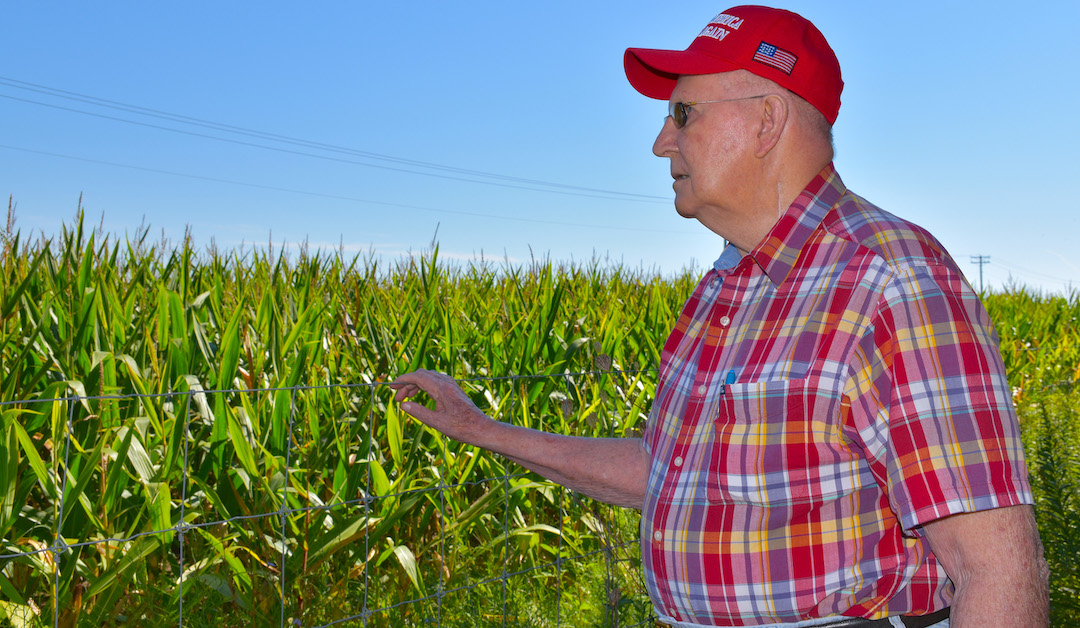
“Halfheartedly, I said, ‘We’re five hours from home. Let’s just drive up and talk to whoever is inside.’”
Pulling into the elevator’s parking lot, Miller glance at his watch: 4:55 p.m. By many standards, it was already closing time.
“I remember how cold and wet it was, but I couldn’t stop. I could feel something pushing me into that building, kind of a sense of urgency,” Miller says, his voice trembling behind a flood of tears. “I walked in and showed the guy a corn sample and it was almost like you could hear the clock ticking on the wall. He was interested in nothing, nothing, nothing but going home.”
Crestfallen, Miller walked back to his vehicle. He had responded to the unseen hand and followed his heart—but was soundly rejected.
The next morning’s telephone call flipped the script. “I hit the jackpot and never looked back, but if I hadn’t grabbed those five minutes, my career would never have been the same,” Miller says, choking with emotion on each word. “I was young and full of myself, and for several years I thought we were just lucky in the moment. I learned that wasn’t true. I learned that it was God who put all the pieces together.”
The Frito Man
On the other end of the phone line, in Pembroke, the elevator owner queried Miller: “Is all of your corn such high-quality? If you can bring me loads, I’ll buy them right now—today.”
The urgency in the potential buyer’s tone triggered Miller’s enterprising mind. If the demand for good corn was surging, where was the end-market?
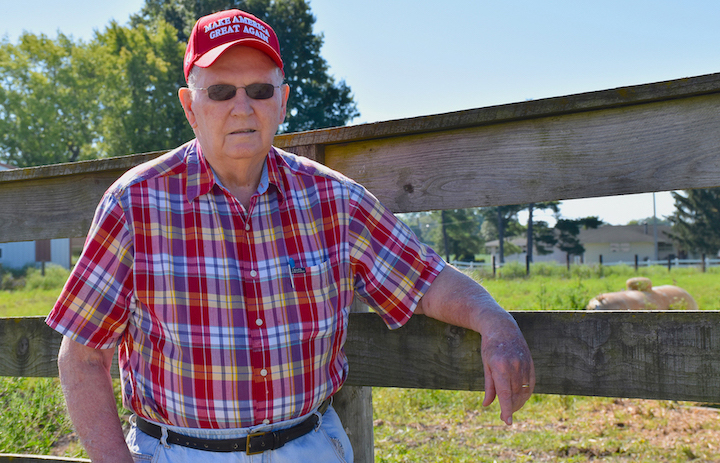
Miller began making phone calls and probing for the source. Within weeks, he found the answer in a company with a name he’d never heard prior—Frito-Lay.
“Frito-Lay? Who or what is a Frito-Lay? I had no idea, but I wanted to know what else they needed,” Miller says.
The Miller brothers blindly had walked into the crossfire of a burgeoning corn chip and tortilla explosion in the U.S. Miller scoured the Yellow Pages and began playing phone tag, searching for the nearest Frito-Lay facility, and found a manufacturing site in Monroe, Wisc., roughly 300 miles north.
“We called the Frito man in Wisconsin and told him we had the best corn for his corn chips,” Miller says, without a shred of irony.
The “Frito man” leaped at the offer. “I still remember what he said,” Miller says. “’Do a good job and you’ll have more business than you ever dreamed.’”
“That Frito man—he was right. They needed a river of corn.”
The Biggest Snowball
Frito-Lay took a massive bite from the Miller’s corn supply, reaching a high of 1 million bushels per year in the 1960s. The Millers built a grain elevator in Oakland to clean, grade, and ship corn to Frito-Lay facilities across the South and East Coast. As demand continued to boom, the Millers built a second elevator in Newman, 10 miles to the north.
The business moved from strength to strength for a decade-plus, until Frito-Lay built an originating facility in nearby Sydney, Illinois. “They then bought direct from farmers and we lost business, but we were still growing with new customers. It was all part of the biggest snowball effect you ever imagined.”
Calling All Tractors
Engaged in agriculture at every rung of the ladder, the Millers continued to farm and build more businesses. In the 1960s, Miller helped develop the Stir-ator, a small auger that moved around the inside of a bin to ensure faster grain drying.
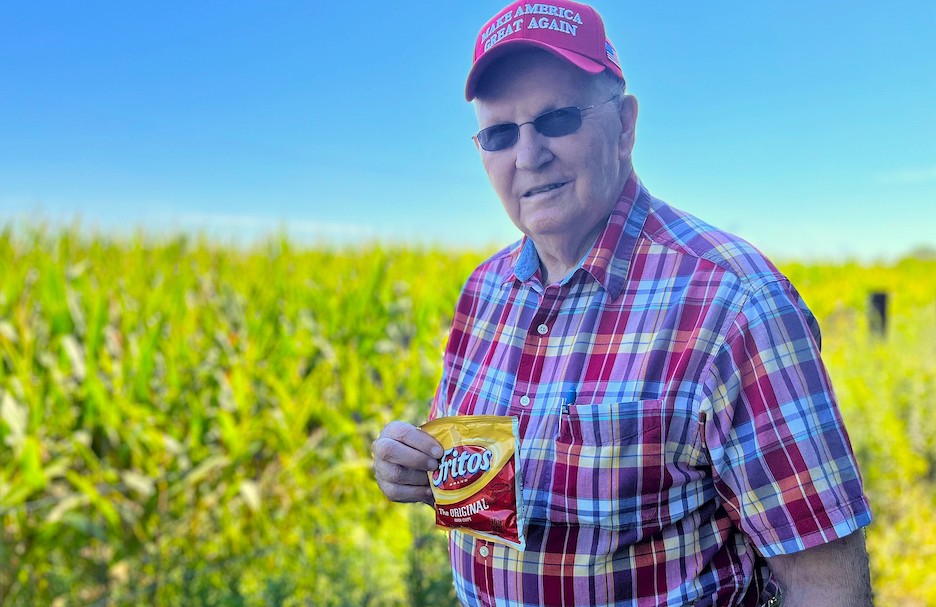
“One afternoon, the inventor of the Stir-ator drives up and says he has a device we have to see,” Miller describes. “He said it had been rejected by every bin company in the Union, but it was the real deal. We hooked it to our bin, watched it work, and struck a deal to sell them in all territory east of the Mississippi River.”
“We sold 15-20 the first year, and got into trouble with hitches and kinks, but we fine-tuned it and it proved to work really good. The business took off and turned to a big success. Imagine: A guy drives up with a grain-drying device and you have to decide in that moment if you are going to invest. That’s all part of the roller-coaster ride of the farming world.”
At the end of the 1960s, Miller (as well as Fred) participated in the Tractor Drive of 1969—the first cross-country farmer protest to call for parity and take to the streets of Washington, D.C. The 1969 Drive originated in Oakland via the willpower of the inimitable Cleo Duzan, with 150 farmers preceding the more well-known tractorcades of the 1970s.
The 1969 Drive gained an audience before the Senate Ag Committee, where Miller read a report on the farm economy and stressed the need for parity: A price on crops that covered cost of production and enabled farmers to make a survivable living.
“Corn was about $1.10, wheat was maybe $1.25, and soybeans were close to $2.50. How do you make a living off that?” asks Miller, who drove the six-state trek atop an open-cab International M. “We were part of a history-making event that I wish farmers of today would remember, because you always pay a higher price later by doing nothing.”
Five Minutes
In 1973, the Millers sold the elevators to Tabor Grain (Decatur) and remained as employees. Tabor later sold to ADM, and again, the Miller brothers stayed as employees. Miller remained as an ADM salesman until his retirement in 2000. Fred became president of Azteca Milling in 1984 and moved to Dallas. Four years after assuming the presidency, in 1988, Fred died after a heart attack.
“It’s been a helluva time and adventure, and a lot of it comes down to a decision I made in a tiny, 5-minute window,” Miller says. “I’ve been blessed the entire way in agriculture business, and with my wonderful wife, Bobbie (decd. January 2021) of 69 years, and a wonderful family. I can’t possibly have any complaints.”
“Remember one thing,” Max Edmund Miller adds. “Never stop working until the time runs out—even when there’s only five minutes left on the clock.”
To read more stories from Chris Bennett (cbennett@farmjournal.com — 662-592-1106), see:
Cottonmouth Farmer: The Insane Tale of a Buck-Wild Scheme to Corner the Snake Venom Market
Tractorcade: How an Epic Convoy and Legendary Farmer Army Shook Washington, D.C.
Bagging the Tomato King: The Insane Hunt for Agriculture’s Wildest Con Man
How a Texas Farmer Killed Agriculture’s Debt Dragon
While America Slept, China Stole the Farm
Bizarre Mystery of Mummified Coon Dog Solved After 40 Years
The Arrowhead whisperer: Stunning Indian Artifact Collection Found on Farmland
Where's the Beef: Con Artist Turns Texas Cattle Industry Into $100M Playground
Fleecing the Farm: How a Fake Crop Fueled a Bizarre $25 Million Ag Scam
Skeleton In the Walls: Mysterious Arkansas Farmhouse Hides Civil War History
US Farming Loses the King of Combines
Ghost in the House: A Forgotten American Farming Tragedy
Rat Hunting with the Dogs of War, Farming's Greatest Show on Legs
Misfit Tractors a Money Saver for Arkansas Farmer
Government Cameras Hidden on Private Property? Welcome to Open Fields
Farmland Detective Finds Youngest Civil War Soldier’s Grave?
Descent Into Hell: Farmer Escapes Corn Tomb Death
Evil Grain: The Wild Tale of History’s Biggest Crop Insurance Scam
Grizzly Hell: USDA Worker Survives Epic Bear Attack
Farmer Refuses to Roll, Rips Lid Off IRS Behavior
Killing Hogzilla: Hunting a Monster Wild Pig
Shattered Taboo: Death of a Farm and Resurrection of a Farmer
Frozen Dinosaur: Farmer Finds Huge Alligator Snapping Turtle Under Ice
Breaking Bad: Chasing the Wildest Con Artist in Farming History
In the Blood: Hunting Deer Antlers with a Legendary Shed Whisperer
Corn Maverick: Cracking the Mystery of 60-Inch Rows







